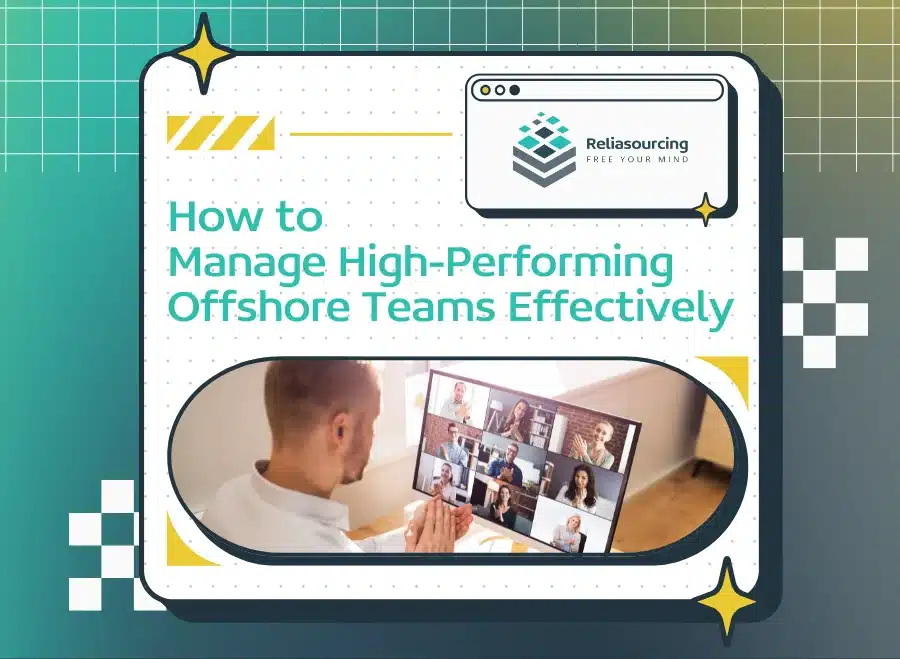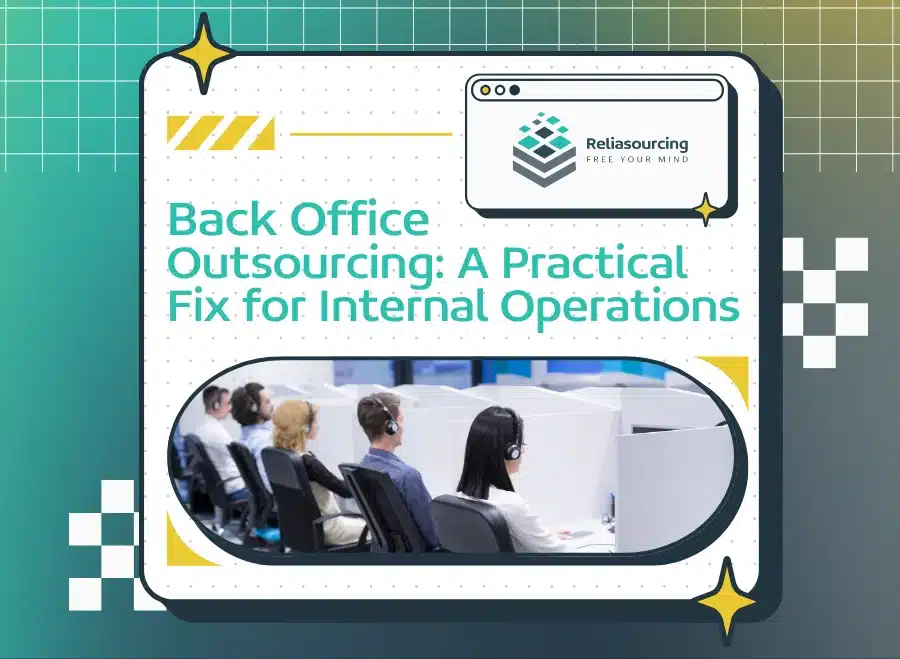It’s high time you rethink your business strategy, and here’s a thought: offshore your teams. Positioned in various countries apart from a company’s main operations, these teams will, of course, offer labor support, but more than this, provide a chance to diversify talent, broaden operational capabilities, and enhance competitiveness.
Companies, from fast-growing startups to Fortune 500 firms, increasingly depend on offshore outsourcing for various functions, including software engineering, customer service, back-office administration, and digital marketing, among many other functions. Offshore teams provide flexible and scalable solutions in a rapidly evolving market, whether you hire directly or partner with business process outsourcing (BPO) providers.
Key Benefits
- Cost efficiency. Businesses can lower operational costs by up to 70% by utilizing talent markets with lower wages yet high capabilities. Outsourcing to the Philippines, well-known for its exceptional English proficiency and strong commitment to service, likewise provides significant cost savings compared to outsourcing to other nations, as the top outsourcing destination in the world.
- Access to specialized talent. Offshore hubs provide access to skilled professionals in software development, finance, data analytics, and customer service, of which are skills that might be scarce domestically.
- Around-the-clock operations. Time zone variations enable businesses to establish round-the-clock support or production cycles, leading to quicker turnarounds and enhanced customer satisfaction.
- Scalability without infrastructure overhead. Offshore teams allow businesses to scale rapidly without requiring considerable investment in office facilities or administrative infrastructure.
Challenges to Consider
Utilizing offshore talent, however, requires more than simple implementation, given it’s not something you can implement overnight. While opportunities arise, they also bring challenges. Numerous teams encounter obstacles that can impede progress success:
- Misaligned expectations due to poor onboarding
- Inefficient communication loops
- Cultural misinterpretations
- Lack of team cohesion
- Micromanagement tendencies from domestic leads
But still, the challenges far outweigh the benefits since offshore outsourcing remains a powerful engine for strategic growth when executed effectively. Conversely, managing poorly can result in inefficiencies, high turnover, and lost opportunities.
The guide below offers in-depth, actionable strategies, real-world examples, and frameworks designed to help you manage high-performing offshore teams with confidence and reliability.
Why Companies Choose Offshore Teams
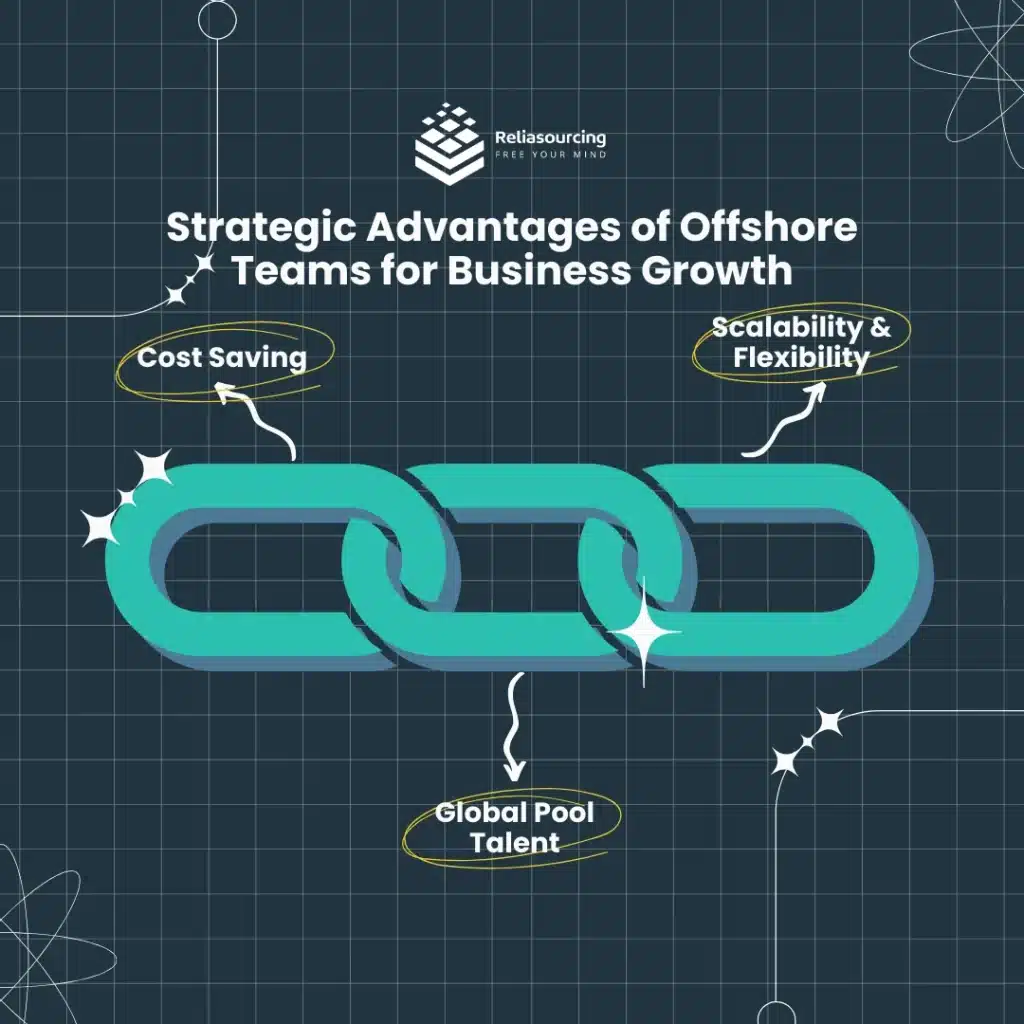
Offshore teams serve as a strategic extension of a company’s workforce, operating outside its headquarters, often in areas such as Southeast Asia, Eastern Europe, or Latin America. Nowadays, businesses regard these teams as essential for cost savings and fostering growth, scalability, and innovation. Offshore outsourcing is a valuable solution for scaling operations, accelerating product development, and improving long-term business agility, whether in software development, customer support, or back-office functions. Firms that strategically leverage offshore partnerships have demonstrated an ability to rapidly adapt to market shifts, fulfill customer demands, and tap into extensive global insights.
Cost savings
Undeniably, labor arbitrage remains one of the most compelling reasons for offshore outsourcing. A business can cut up to 70% in labor costs while maintaining quality by hiring in countries with lower living costs, such as the Philippines, India, or Vietnam. Financial flexibility enables companies to reinvest in high-impact areas such as research and development (R&D), expand go-to-market strategies, increase marketing spend, or enhance employee training and customer success initiatives. Cost savings likewise make it easier to invest in emerging technologies, improve infrastructure, or pilot experimental projects that may otherwise be financially infeasible.
Moreover, companies realize savings beyond salaries. They avoid office rent, healthcare benefits, taxes, and regulatory overhead expenses, thereby reducing operational friction and freeing up cash for growth and innovation. For startups and scale-ups, this level of financial agility can mean the difference between stalling and thriving in competitive industries.
Case Example: Apple’s Manufacturing Strategy. In the early 2000s, Apple transformed its manufacturing by outsourcing to China, leveraging lower labor costs and high-volume capabilities, thereby reducing expenses and facilitating reinvestment in R&D and marketing, which contributed to Apple’s rise as a $2 trillion tech leader.
Access to a global talent pool
Expanding your talent search globally allows you access to specialists not readily available in your local market. For fast-scaling companies, this means faster product releases and improved service levels across key operational areas like finance, IT, cybersecurity, logistics, and digital marketing. And it’s even better now since many offshoring destinations offer multilingual professionals who are tech-savvy and highly adaptable to Western business culture.
In a world where top talent is often the limiting factor for growth, accessing an international pipeline of developers, analysts, designers, and administrators can dramatically accelerate execution. Additionally, companies can benefit from local market knowledge, especially if they’re entering or serving customers in those regions.
Case Example: WhatsApp’s Global Development Strategy. WhatsApp successfully leveraged offshore talent by outsourcing development to Russian engineers, allowing founders Jan Koum and Brian Acton to focus on core operations and enhance product maturity. The strategy enabled rapid growth to 2 billion users, culminating in a $19 billion acquisition by Facebook in 2014.
Scalability and flexibility
Offshore teams allow companies to adjust quickly to changing market conditions. Managed services providers and BPO firms offer variable engagement models from project-based work to full-time embedded teams, making it easier to scale operations up or down based on immediate business needs. The flexibility ensures businesses adapt to spikes in demand, launch new service lines, or pivot strategically without the burden of expanding internal headcount.
Do you need to establish 24/7 customer support service within a month? Are you interested in creating a multilingual team to cater to global clientele? Offshore staffing solutions enable this without the hassle of bureaucratic procedures or infrastructure expenses. Offshore partners make scalability seamless from a small pilot team to a 200-person operations hub.
And because offshore models often come with built-in operational support, such as HR, payroll, IT, and compliance, internal leaders can focus on core business objectives instead of administrative management, making the organization more agile and efficient.
Case Example: Reliasourcing & LoanTech Client. To scale operations rapidly, a loan processing company partnered with Reliasourcing, growing its offshore team from 9 to 46 agents. Through customized training, they boosted operational efficiency by 230%, streamlined loan approvals, and maintained regulatory compliance—all while freeing internal resources to focus on innovation.
Key Challenges in Managing Offshore Teams
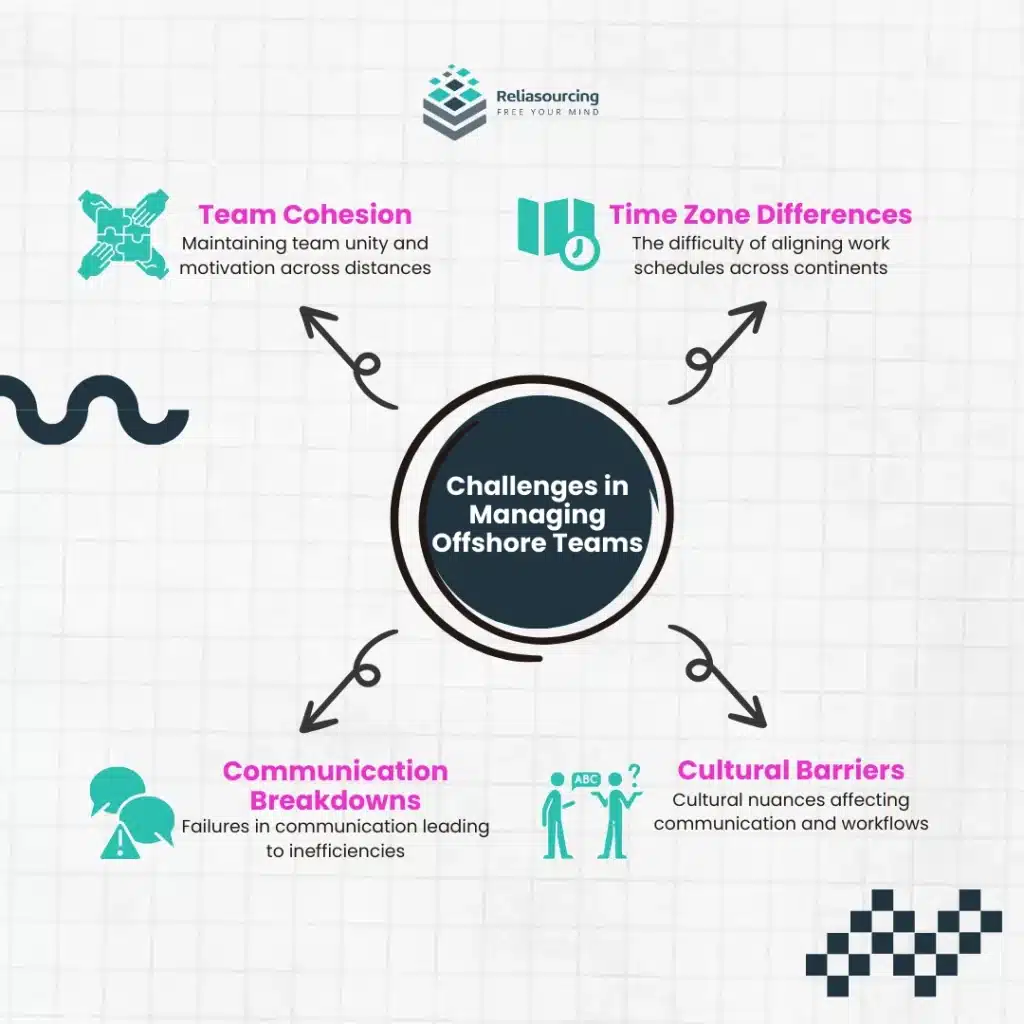
While offshore outsourcing provides significant upside, it also comes with inherent complexities. Effectively managing distributed teams requires intention, consistency, and a proactive approach to solving challenges that can easily erode productivity.
Many of these difficulties are closely tied to the fundamental reasons why companies choose to outsource work, especially when internal resources become strained or in-house capabilities are limited.
Time zone differences
When teams are distributed across continents, aligning work schedules becomes tricky. Misaligned handoffs can delay project timelines and introduce inefficiencies, especially in fast-paced environments. Leaders must establish overlapping working hours or leverage asynchronous workflows to keep operations moving.
Cultural and language barriers
Cultural nuances, from indirect communication styles to varied interpretations of urgency, can disrupt workflows. What one culture sees as a sign of respect may be viewed as a lack of initiative in another. Language proficiency also impacts documentation or real-time collaboration, particularly in technical or client-facing roles.
Communication breakdowns
The success of remote teams hinges on effective communication. Without structured systems, tasks can easily fall through the cracks. Miscommunication can lead to duplicated work, missed deadlines, and fractured trust.
Maintaining team cohesion and motivation
The distance can breed disengagement. Without intentional integration, offshore teams may feel disconnected from the company’s mission, values, or culture, leading to lower morale and higher turnover, especially if employees feel isolated or underappreciated.
Best Practices for Managing Offshore Teams Effectively
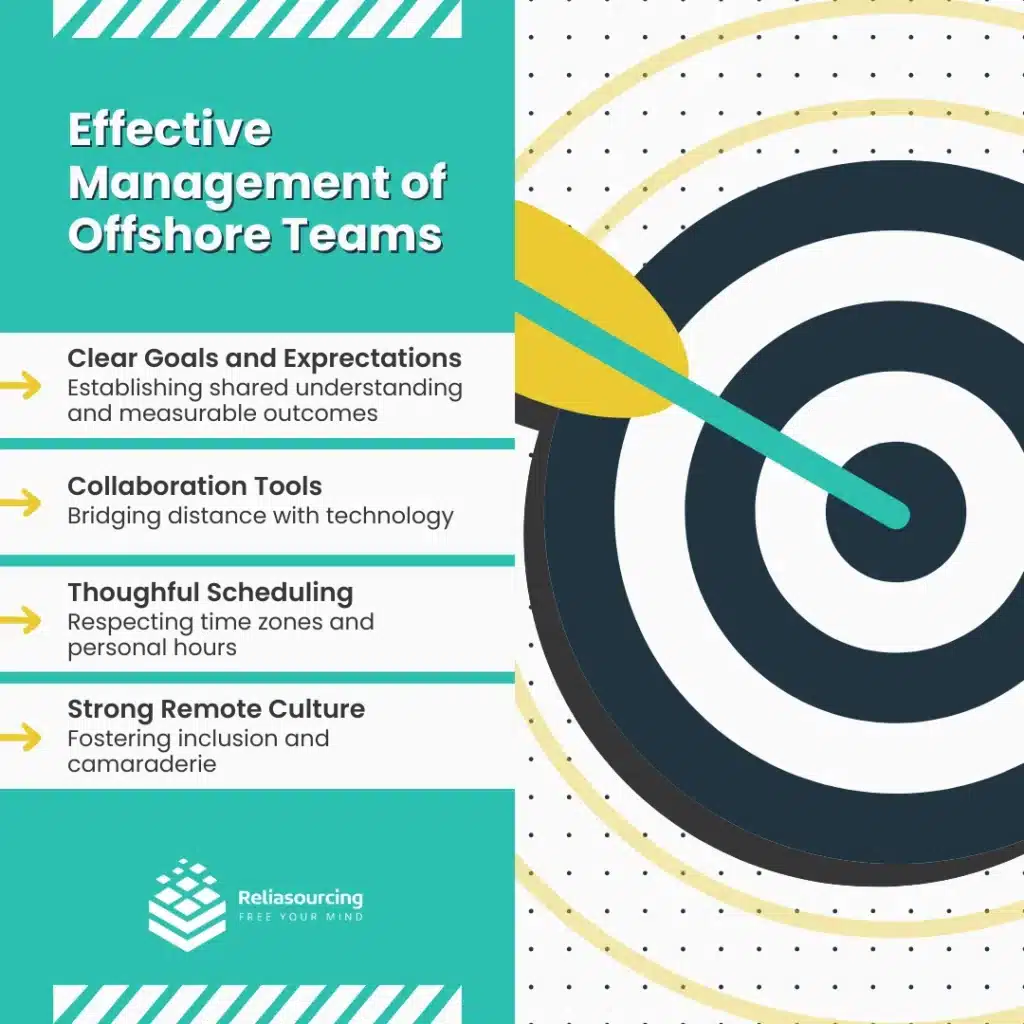
Businesses must focus on intentional leadership, cultural integration, and scalable systems rather than just logistics to enhance the performance of offshore teams. From industry insights, here’s what works:
1. Set clear goals and expectations
A shared understanding of success prevents ambiguity. Use tools like OKRs (Objectives and Key Results) or KPIs (Key Performance Indicators) to define measurable outcomes and establish SOPs (Standard Operating Procedures) for everyday tasks. Set milestones, communicate deadlines, and revisit these regularly through structured check-ins and performance reviews.
2. Leverage the right collaboration tools
A powerful tech stack bridges the physical distance and maintains clear forward momentum. Consider the following tools that help enforce transparency, accountability, and operational rhythm:
- Slack for quick communication and topic-based channels
- Asana, Trello, or Jira for workflow and task management
- Zoom and Google Meet for real-time interactions
- Loom or Vidyard for asynchronous updates
- Notion or Confluence as a centralized knowledge base
3. Schedule thoughtfully across time zones
Global teams thrive on mutual respect. Rotate meeting times when possible and maintain a master calendar that’s accessible to all. Rely on asynchronous video updates or documentation to reduce meeting fatigue and respect personal work hours.
4. Foster a strong remote culture
Company culture doesn’t need a physical office. It requires intention. Celebrate birthdays, share wins, recognize milestones, and set time aside for non-work conversation. Consider cultural awareness programs, buddy systems, or mentorship programs to create bonds.
Reliasourcing, for example, builds comprehensive onboarding journeys that foster inclusion by including cultural immersion, peer networking, and manager shadowing.
Want to keep it easy and tick down a checklist of the things you have to do and prepare before managing offshore teams? Download this checklist to keep you on track!
Common Mistakes to Avoid
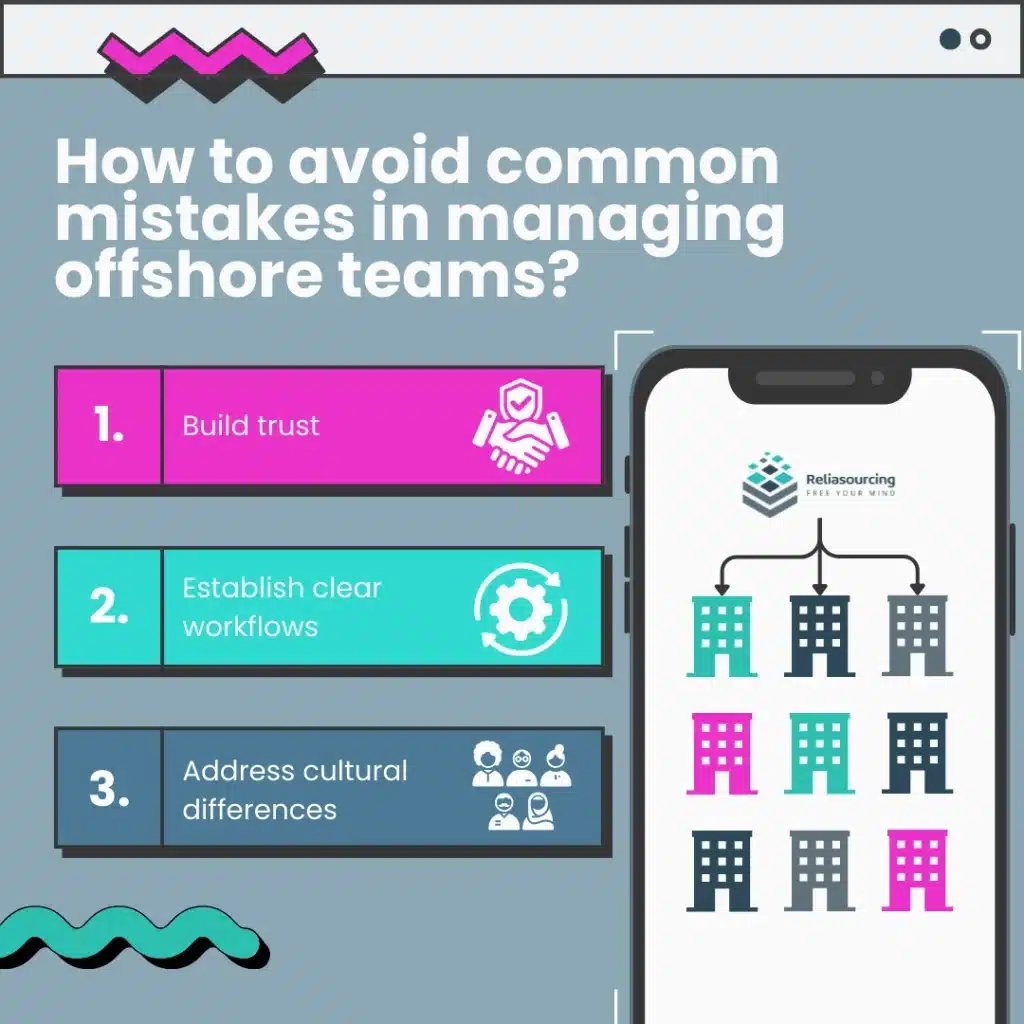
Even with the best intentions, companies can stumble. Failing to anticipate the unique dynamics of managing offshore teams can create inefficiencies and affect overall business performance. Below is a detailed breakdown of some of the most frequent—and preventable—pitfalls that undermine offshore team outcomes.
- Micromanagement and lack of trust. One of the most common and detrimental mistakes is excessive oversight. Treating offshore staff as task executors undermines their creativity, motivation, and sense of ownership, leading to slower decision-making, poor morale, and increased turnover. Building trust means granting autonomy, allowing local managers to take charge, and trusting teams to deliver outcomes, not just follow instructions.
- Failing to establish clear workflows. Vague task assignments or fluid expectations quickly derail offshore operations. Without well-defined SOPs and project tracking tools, teams may end up duplicating efforts or prioritizing tasks incorrectly, causing delays and fostering frustration and disengagement among the team. Best to note: high-performing offshore teams thrive on structure and clarity.
- Ignoring cultural differences. Cultural intelligence is a necessity. A lack of cultural awareness can manifest in misinterpreted emails, unspoken confusion during meetings, or perceived disrespect in decision-making. Differences in hierarchical expectations, feedback styles, and conflict-resolution methods need to be understood and actively addressed. Cultural sensitivity training and cross-cultural team-building sessions can easily bridge these gaps.
Avoiding these mistakes doesn’t require enormous budgets, just foresight, empathy, and systems thinking. Identifying these warning signs early allows leaders to establish more sustainable and rewarding offshore partnerships that enhance overall value and ensure clear-cut longevity.
Frequently Asked Questions
How do you onboard new offshore team members efficiently?
To onboard new offshore team members efficiently, you need a multi-layered strategy that integrates training, culture, and communication from day one. Implement a structured welcome process with personalized onboarding kits, essential tools, and tailored orientation materials to integrate new hires into your company culture. Reliasourcing enhances this experience with custom playbooks, scheduled feedback loops, and cultural deep dives, ensuring new employees feel prepared and included.
How do you effectively communicate with an offshore team?
To effectively communicate with an offshore team, businesses should implement a blended communication model that balances synchronous (real-time) and asynchronous interactions. Use tools like Zoom and Slack for real-time communication, while relying on Loom, Notion, and email for detailed updates. Establish clear protocols and shared norms to streamline workflows and reduce confusion.
How do you get maximum productivity from an offshore team?
To get maximum productivity from an offshore team, you need to align goals, clarify expectations, and create an environment that fosters both accountability and autonomy. To boost productivity, define OKRs and deliverables for each role, provide the right tools, offer regular feedback and training, recognize performance, and ensure offshore teams see how their work aligns with the company’s mission.
How can cultural training improve offshore team collaboration?
Cultural training can improve offshore team collaboration by increasing awareness of communication styles, work norms, and social values across different geographies. Understanding cultural nuances fosters team empathy and collaboration. That’s why Reliasourcing’s culture-specific onboarding and workshops promote respect and unity within global teams.
How Reliasourcing Makes Managing Offshore Teams Effortless
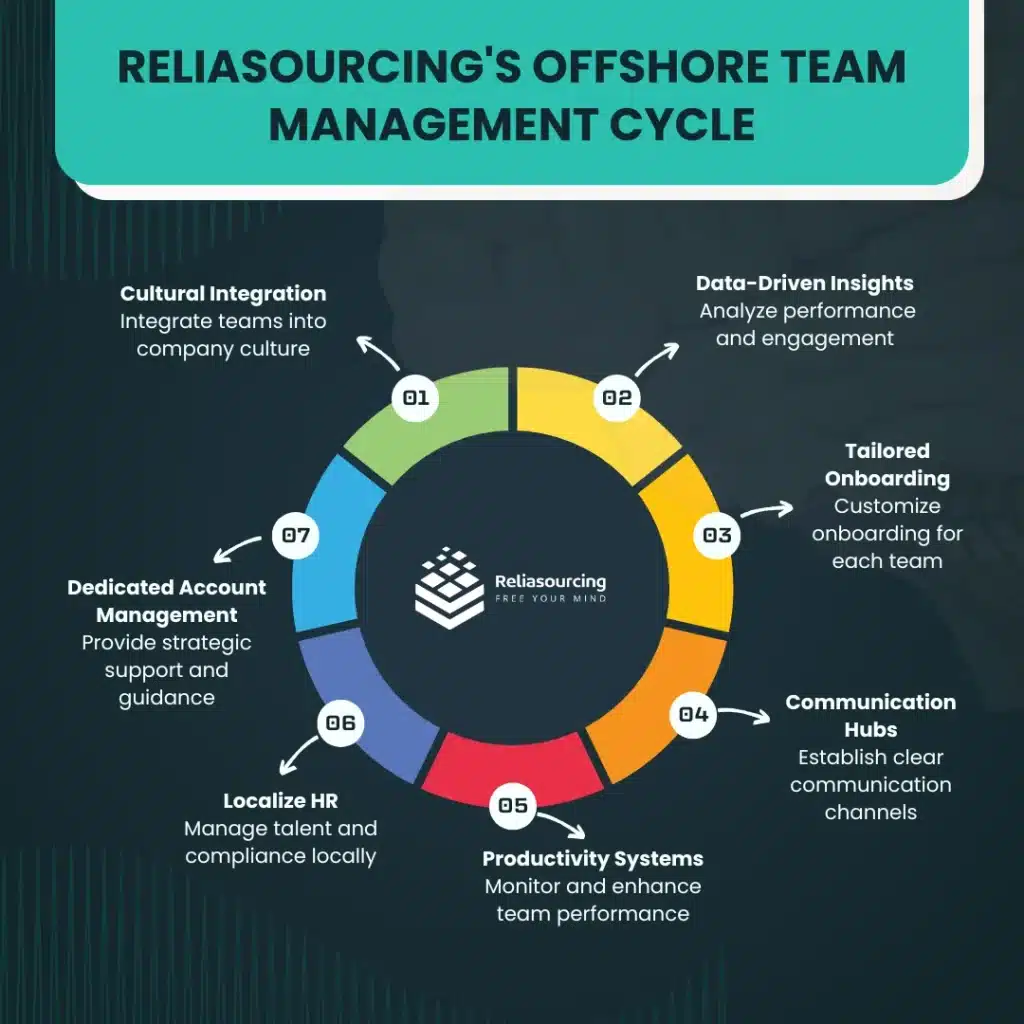
Reliasourcing simplifies managing global talent with an integrated, end-to-end outsourcing partnership for modern businesses. We develop a scalable workforce infrastructure promoting growth, agility, and innovation. Here’s how we deliver impact at every stage:
- Tailored onboarding. We customize our onboarding process for each role and industry, creating tailored 30, 60, or 90-day plans to ensure teams start with clarity and confidence.
- Communication hubs. We create centralized collaboration hubs that integrate tools like Slack and Zoom to enhance communication, streamline processes, and ensure team alignment across time zones.
- Productivity systems. Reliasourcing enhances supervision with real-time KPI dashboards, project milestones, sentiment data, and optional agile coaching for continuous team improvement.
- Localized HR and talent management. As your offshore team expands, our HR teams manage compliance and career development while offering training and mentoring to enhance retention and workforce stability.
- Dedicated account management. Each client gets a dedicated account manager to ensure goal achievement and seamless collaboration through hands-on support.
- Cultural integration programs. We integrate culture into every interaction through meetups, onboarding, and workshops, ensuring your offshore team feels like a part of your organization rather than an external vendor.
- Data-driven insights. We provide insights on productivity and engagement through custom dashboards and monthly summaries to inform decision-makers on team health and performance trends.
As a leading managed services and business process outsourcing (BPO) provider, Reliasourcing helps businesses scale confidently. We can meet your needs, whether you need a team of five or fifty, support, or a technical center of excellence. Our goal is to design and manage your workforce for sustained performance.
Explore offshore outsourcing with Relisourcing to tackle your growth challenges. We’re here to help you grow further, faster.
The Bottom Line: Managing Offshore Teams
Offshore teams extend beyond reducing expenses. They are vital for enhancing capacity and expanding reach. When guided by transparency, cultural awareness, and mutual trust, they evolve into partners in innovation rather than only providing support. Teams possess the capability to foster ongoing improvement, encourage diverse perspectives, and heighten agility in a constantly changing market.
An effective offshore strategy provides operational flexibility that in-house teams often struggle to achieve. Offshore partners contribute additional resources, enable around-the-clock support, and offer new insights into longstanding operational challenges. Companies can utilize offshore talent to increase the speed of product delivery, improve customer support, and tap into specialized skills, enabling them to complete tasks more rapidly and efficiently.
However, achieving this level of collaboration doesn’t happen automatically. It takes strategic planning, consistent engagement, and cultural inclusion. Leaders must ask themselves:
- Are you enabling ownership and autonomy across borders?
- Do your systems promote transparency and performance?
- Is your culture truly inclusive of your global team?
- Are feedback loops functioning both ways?
- Do your offshore employees see a future in your organization?
- Are there activities and routines that help unify your dispersed teams?
If the answer to any of these is no, you have to face it: it’s not a missed opportunity, it’s a competitive vulnerability. Disengaged teams don’t drive innovation, and isolated workers don’t champion your brand.
The good news? Every one of these issues is solvable. And with a partner like Reliasourcing, you don’t have to solve them alone. We work with clients to remove friction, enhance communication, and build the systems that power true offshore excellence.
Let Reliasourcing help you transform offshore management into a strategic advantage. Unlock the full value of your global workforce. Contact us today!

